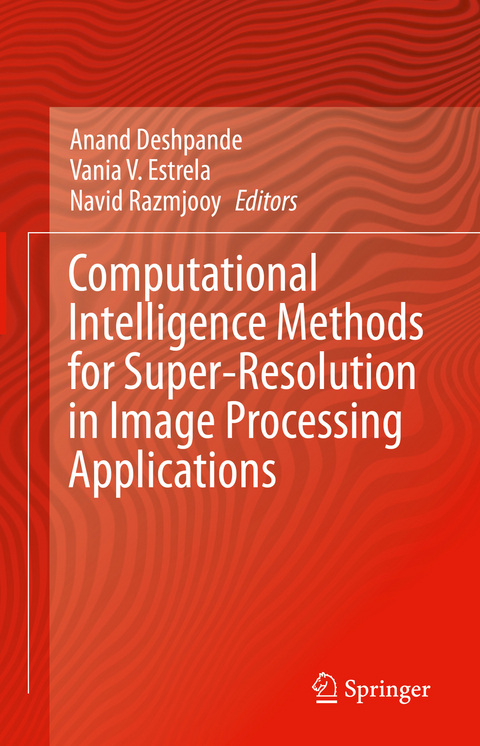
Computational Intelligence Methods for Super-Resolution in Image Processing Applications
Springer International Publishing (Verlag)
978-3-030-67920-0 (ISBN)
This book explores the application of deep learning techniques within a particularly difficult computational type of computer vision (CV) problem super-resolution (SR). The authors present and discuss ways to apply computational intelligence (CI) methods to SR. The volume also explores the possibility of using different kinds of CV techniques to develop and enhance the tools/processes related to SR. The application areas covered include biomedical engineering, healthcare applications, medicine, histology, and material science. The book will be a valuable reference for anyone concerned with multiple multimodal images, especially professionals working in remote sensing, nanotechnology and immunology at research institutes, healthcare facilities, biotechnology institutions, agribusiness services, veterinary facilities, and universities.
lt;p>Anand Deshpande
Dr. Anand Deshpande received Bachelor of Engineering in Electronics and Communication Engineering in 2001 from Gogte institute of Technology, Belagavi, Karnataka University Dharwad, Karnataka, India, and Master of Technology in Digital Communication and Networking in 2006 from Gogte institute of Technology, Visvesvaraya Technological University, Belagavi, Karnataka, India and Ph.D. from Visvesvaraya Technological University, Belagavi, Karntaka, India. He is currently serving as the Principal and Director of Suresh Angadi Education Foundation's Angadi Institute of Technology and Management, Belagavi, Karntaka, India. Research work has been published in several reputed international journals (SCIE and SCOPUS), International conferences and books along with patents filed. Reviewer for various reputed journals like IEEE Access, IET, Springer-International Journal of Fuzzy Systems, etc. Skilled in Artificial Intelligence, Image & Video Analytics, Data Analytics and Machine Vision.
Dr. Vania V. Estrela
B.Sc. degree from Federal University of Rio de Janeiro (UFRJ) in Electrical and Computer Engineering (ECE); M.Sc. in ECE from the Technological Institute of Aeronautics (ITA) and Northwestern University, USA; and Ph.D. in ECE from the Illinois Institute of Technology (IIT), Chicago, IL, USA. Taught at: DeVry Univ.; DePaul Univ.; UENF; UEZO; and IPRJ/UERJ. Faculty at UFF, RJ, Brazil. Telecommunications Department. Areas of Interests: Signal/image/video processing, inverse problems, computational & mathematical modeling, stochastic models, multimedia, digital inclusion, health informatics, machine learning, ambient intelligence, cyber-physical systems, environmental issues, public health, humanitarian engineering, internet of things, electronic instrumentation, STEM education, environmental issues and remote sensing. Dr. Estrela has a great experience coordinating multidisciplinary R&D groups and organizing conferences. Reviewer for: IMAVIS (Elsevier); Pattern Recognition (Elsevier); COMPELECENG (Elsevier); Measurement (Elsevier); IET Image Processing; EURASIP Journal on Advances in Signal Processing (JASP) (Springer); IEEE Journal of Biomedical and Health Informatics (JBHI); Int'l J. of Electrical and Comp. Engineering (IJECE); Int'l Journal of Ambient Computing and Intelligence (IJACI); Journal of Microwaves, Optoelectronics and Electromagnetic Applications (JMOE); among other publications. Member of IEEE. Editor of IJACI, and EURASIP JASP. She has edited several books.
Dr. Navid Razmjooy
Dr. Navid Razmjooy holds a Ph.D. in Electrical Engineering (Control and Automation) from Tafresh University, Iran (2018). B.Sc. by Ardabil branch of IAU University, Iran (2007), M.Sc. from Isfahan branch of IAU University, Iran with honor in Mechatronics Engineering (2011), and a research opportunity in Amirkabir University of Technology (2017-2018). Hewas born in 1988. He is working in the following subjects: Renewable Energies, Control, Interval analysis, Optimization, Image Processing, Machine Vision, Soft Computing, Data Mining, Evolutionary Algorithms, and System Control. He is a senior member of IEEE/USA and YRC in IAU/Iran. He published more than120 papers and 5 books in English and Farsi in peer-reviewed journals and conferences and is now a reviewer in several national and international journals and conferences.
Part I. A Panorama of Computational Intelligence in Super-Resolution Imaging.- Chapter 1. Introduction to Computational Intelligence and Super-Resolution.- Chapter 2. Review on Fuzzy Logic Systems with Super-Resolved Imaging and Metaheuristics for Medical Applications.- Chapter 3. Super-Resolution with Deep Learning Techniques-A Review.- Chapter 4. A Comprehensive Review of CAD Systems in Ultrasound and Elastography for Breast Cancer Diagnosis.- Part II. State-of-the-Art Computational Intelligence in Super-Resolution Imaging.- Chapter 5. Pictorial Image Synthesis from Text and Its Super-Resolution using Generative Adversarial Networks.- Chapter 6. Analysis of Lossy and Lossless Compression Algorithms for Computed Tomography Medical Images Based on Bat and Simulated Annealing Optimization Techniques.- Chapter 7. Super resolution-based Human-Computer Interaction System for Speech and Hearing Impaired using Real-Time Hand Gesture Recognition System.- Chapter 8. Lossy Compression of NoisyImages Using Autoencoders for Computer Vision Applications.- Chapter 9. Recognition of Handwritten Nandinagari Palm Leaf Manuscript Tex.- Chapter 10. Deep Image Prior and Structural Variation Based Super-Resolution Network for Fluorescein Fundus Angiography Images.- Chapter 11. Lightweight Spatial Geometric Models Assisting Shape Description and Retrieval and Relative Global Optimum Based Measure for Fusion.- Chapter 12. Dual-Tree Complex Wavelet Transform and Deep CNN-based Super-Resolution for Video Inpainting with Application to Object Removal and Error Concealment.- Chapter 13. Super-Resolution Imaging and Intelligent solution for Classification, Monitoring and Diagnosis of Alzheimer's Disease.- Chapter 14. Image Enhancement using Non-Local Prior and Gradient Residual Minimization for Improved Visualization of Deep Underwater Image.- Chapter 15. Relative Global Optimum Based Measure for Fusion Technique in Shearlet Transform Domain for Prognosis of Alzheimer Disease.
| Erscheinungsdatum | 30.05.2021 |
|---|---|
| Zusatzinfo | XIV, 305 p. 155 illus., 110 illus. in color. |
| Verlagsort | Cham |
| Sprache | englisch |
| Maße | 155 x 235 mm |
| Gewicht | 601 g |
| Themenwelt | Informatik ► Theorie / Studium ► Künstliche Intelligenz / Robotik |
| Medizin / Pharmazie ► Physiotherapie / Ergotherapie ► Orthopädie | |
| Technik ► Elektrotechnik / Energietechnik | |
| Schlagworte | Artificial Intelligence • Automatic diagnosis • Big Data • biomedical engineering • Computational Intelligence • Image Processing • Microscopy • multimodal images • Multiresolution images • nanotechnology • Super-resolution |
| ISBN-10 | 3-030-67920-9 / 3030679209 |
| ISBN-13 | 978-3-030-67920-0 / 9783030679200 |
| Zustand | Neuware |
| Haben Sie eine Frage zum Produkt? |
aus dem Bereich


